Strategies for combating corruption
This document outlines strategies for combating corruption. It discusses the need to design holistic and practical strategies with clear objectives and stakeholder involvement. Ten specific strategies are then presented: 1) Increased support for anti-corruption efforts from government, civil society and private sector. 2) Greater political dialogue on corruption issues and agreement on robust targets. 3) Assisting communities to monitor budgets and hold officials accountable. 4) Monitoring distribution of agricultural inputs. 5) Supporting investigations and prosecutions of corruption cases. 6) Giving voice to public opinions on corruption. 7) Strengthening financial management and audit capacity. 8) Setting up independent co-monitoring structures. 9) Developing education curriculum on ethics and integrity. 10)

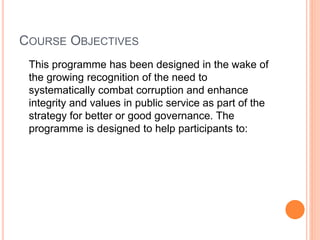
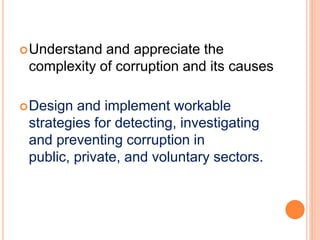
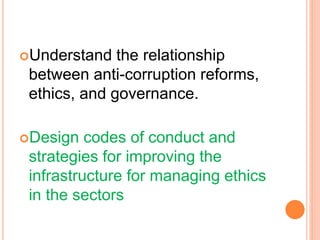
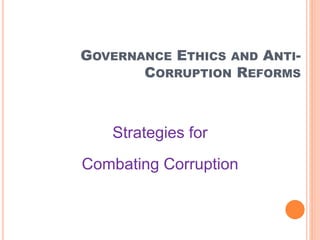
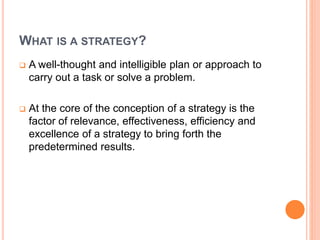
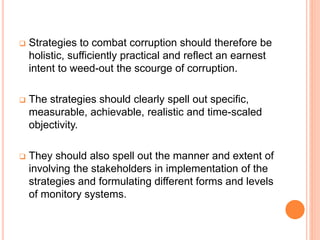
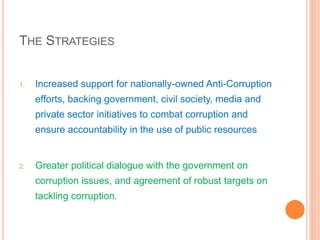
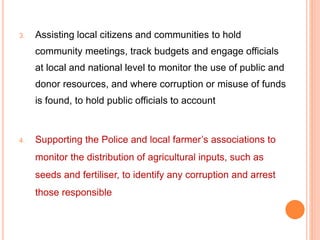
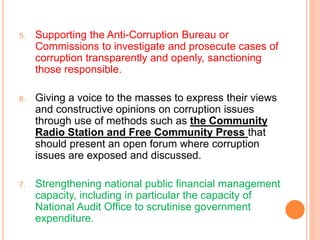
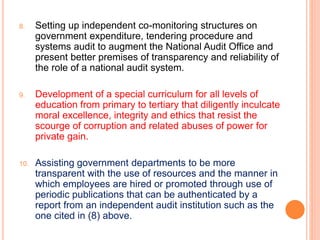
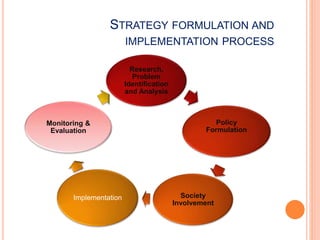


Recommended
More Related Content
Viewers also liked (13)
Similar to Strategies for combating corruption (20)
Recently uploaded (11)
Strategies for combating corruption
- 1. GOVERNANCE ETHICS AND ANTI- CORRUPTION REFORMS 26 ŌĆō 30 MAY 2014 Facilitator Tonderayi Chikanda
- 2. COURSE OBJECTIVES This programme has been designed in the wake of the growing recognition of the need to systematically combat corruption and enhance integrity and values in public service as part of the strategy for better or good governance. The programme is designed to help participants to:
- 3. ’éóUnderstand and appreciate the complexity of corruption and its causes ’éóDesign and implement workable strategies for detecting, investigating and preventing corruption in public, private, and voluntary sectors.
- 4. ’éóUnderstand the relationship between anti-corruption reforms, ethics, and governance. ’éóDesign codes of conduct and strategies for improving the infrastructure for managing ethics in the sectors
- 5. GOVERNANCE ETHICS AND ANTI- CORRUPTION REFORMS Strategies for Combating Corruption
- 6. WHAT IS A STRATEGY? ’ü▒ A well-thought and intelligible plan or approach to carry out a task or solve a problem. ’ü▒ At the core of the conception of a strategy is the factor of relevance, effectiveness, efficiency and excellence of a strategy to bring forth the predetermined results.
- 7. ’ü▒ Strategies to combat corruption should therefore be holistic, sufficiently practical and reflect an earnest intent to weed-out the scourge of corruption. ’ü▒ The strategies should clearly spell out specific, measurable, achievable, realistic and time-scaled objectivity. ’ü▒ They should also spell out the manner and extent of involving the stakeholders in implementation of the strategies and formulating different forms and levels of monitory systems.
- 8. THE STRATEGIES 1. Increased support for nationally-owned Anti-Corruption efforts, backing government, civil society, media and private sector initiatives to combat corruption and ensure accountability in the use of public resources 2. Greater political dialogue with the government on corruption issues, and agreement of robust targets on tackling corruption.
- 9. 3. Assisting local citizens and communities to hold community meetings, track budgets and engage officials at local and national level to monitor the use of public and donor resources, and where corruption or misuse of funds is found, to hold public officials to account 4. Supporting the Police and local farmerŌĆÖs associations to monitor the distribution of agricultural inputs, such as seeds and fertiliser, to identify any corruption and arrest those responsible
- 10. 5. Supporting the Anti-Corruption Bureau or Commissions to investigate and prosecute cases of corruption transparently and openly, sanctioning those responsible. 6. Giving a voice to the masses to express their views and constructive opinions on corruption issues through use of methods such as the Community Radio Station and Free Community Press that should present an open forum where corruption issues are exposed and discussed. 7. Strengthening national public financial management capacity, including in particular the capacity of National Audit Office to scrutinise government expenditure.
- 11. 8. Setting up independent co-monitoring structures on government expenditure, tendering procedure and systems audit to augment the National Audit Office and present better premises of transparency and reliability of the role of a national audit system. 9. Development of a special curriculum for all levels of education from primary to tertiary that diligently inculcate moral excellence, integrity and ethics that resist the scourge of corruption and related abuses of power for private gain. 10. Assisting government departments to be more transparent with the use of resources and the manner in which employees are hired or promoted through use of periodic publications that can be authenticated by a report from an independent audit institution such as the one cited in (8) above.
- 12. STRATEGY FORMULATION AND IMPLEMENTATION PROCESS Research, Problem Identification and Analysis Policy Formulation Society Involvement Implementation Monitoring & Evaluation
- 13. QUESTIONS ?
